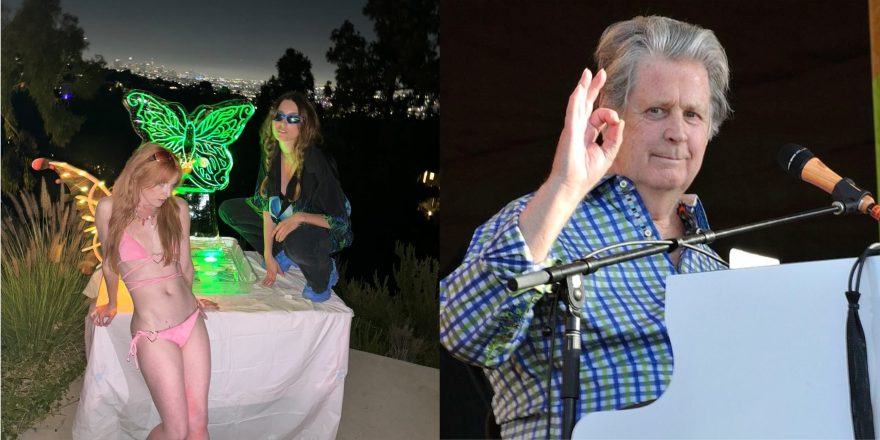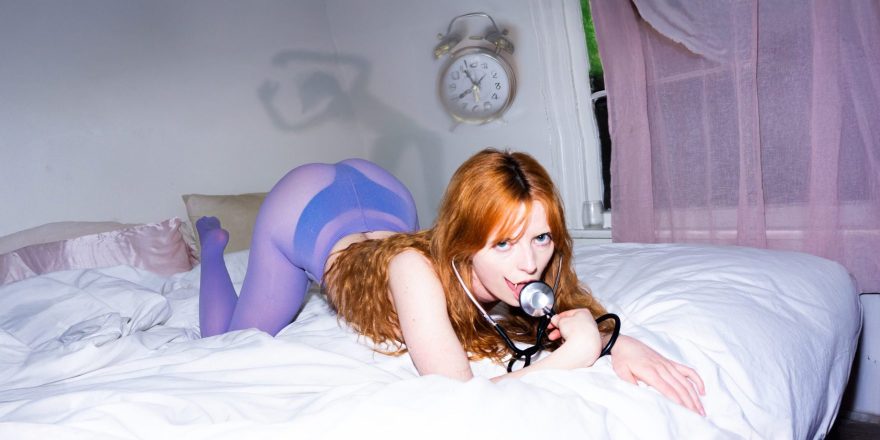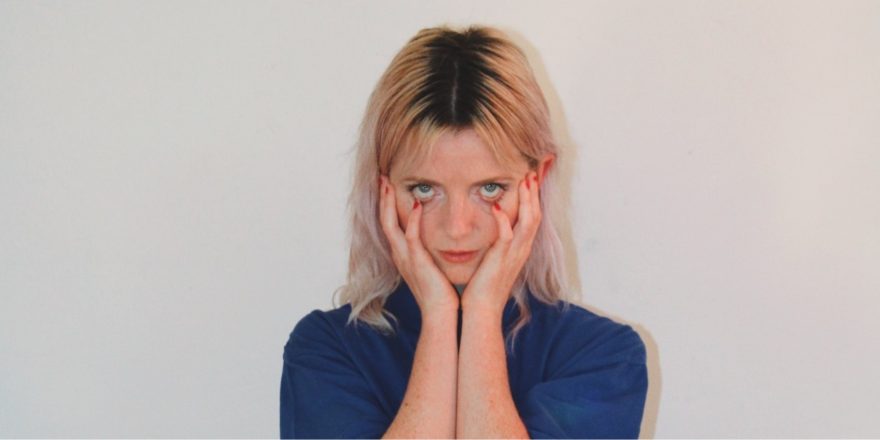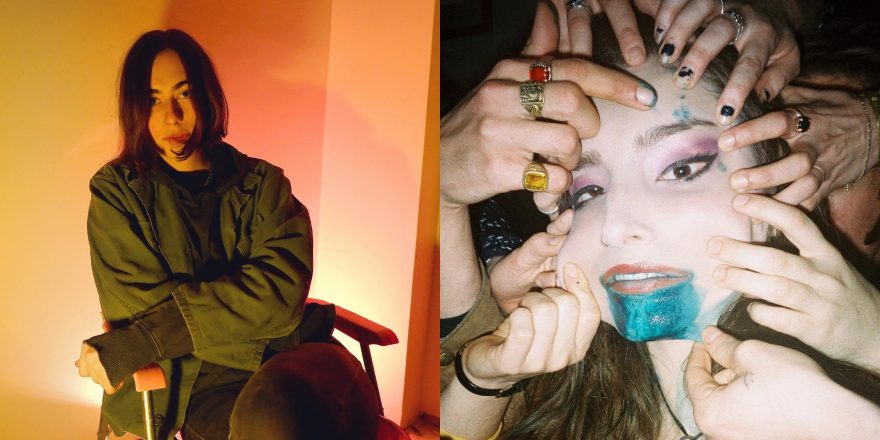Ember Knight is a multimedia artist whose latest record, Water Can Fly, just came out last week (alongside the launch of their “dark ride,” a DIY carnival ride-slash-immersive listening experience); Haley Dahl is a singer-songwriter and the mastermind behind the experimental chamber pop band Sloppy Jane. Brian Wilson’s influence is incredibly apparent in both of their work, so in the wake of his passing, the two best friends caught up about how their time working at a strip club in Hawthorne, CA — which incidentally included a period during which they were obsessed with The Beach Boys’ Smiley Smile — was the “Chemical X concoction” that made them the artists they are today.
— Annie Fell, Editor-in-chief, Talkhouse Music
Ember Knight: Have you seen Norbit?
Haley Dahl: [Laughs.] No, I haven’t seen Norbit.
Ember: I also have not. So am I really a fan? I don’t know.
Haley: I don’t know. Maybe I’m not.
Ember: I remember someone told me an anecdote — maybe you told me? Somebody told me this anecdote that they met him at a hospital and asked for an autograph, and there was nowhere to put down the piece of paper so he got down on his hands and knees and did the autograph on the floor.
Haley: That’s beautiful. Do you want to talk about our Beach Boys journey?
Ember: It’s a tale as old as time, our Beach Boys journey.
Haley: I feel like something to acknowledge is that Brian Wilson is a common foundation in our music and our work in general.
Ember: Totally.
Haley: [You and I] make stuff that is very similar, often on accident, and I’m wondering if he’s the source.
Ember: We do both have make-everybody-wear-fireman-hats energy.
Haley: Yeah, we do.
Ember: But I think you’re right. I think there’s two possibilities: One is that we just randomly make similar stuff, and the other is that it’s Brian Wilson’s fault.
Haley: I feel like it’s Brian Wilson and the strip club.
Ember: Which is an insane collaboration.
Haley: Except for that the strip club was very, very close to Brian Wilson’s childhood home.
Ember: It was our Hawthorne era.
Haley: Somehow, both of those things together were the weird Chemical X concoction — and then we both had big bands where we were nude on stage. Then your second album had crying with paints, my second album had crying with paints. You have built a ride, I have wanted to build a roller coaster. None of these things specifically have to do with Brian Wilson… But I feel like they somehow do.
Ember: It is the chemical reaction between the strip club and Brian Wilson, yes. Because he does kind of feel like a patron saint for sex workers. I know a lot of women who just love him and worship him.
Haley: He’s one of the girls.
Ember: He’s one of the girls, truly. The way he was abused was so specifically like the way that women are kept.
Haley: And the way that his mental illness aura was very feminine.
Ember: It’s so Hollywood glam lady.
Haley: Lying in bed and eating hamburgers…
Ember: I’ve done that. It’s very fainting couch…
Haley: Victorian traumatized woman behavior.
Ember: Yeah. So you have some strip club trauma, and then you add some Beach Boys — which is music that comes, clearly, from trauma also — and you get being nude on stage with your big band. Wanting to build a ride. Crying with paint. This makes sense.
Haley: [Laughs.] Something that I think is in both of our stuff that is directly Brian Wilson is the presence of an audience in the music. Which comes from Smiley Smile, basically. The presence of the room the music is existing in, the chatter. The reactions to the music is built into the music.
Ember: Yeah. Which is very ahead of its time, because people are doing that constantly. People’ve got skits, they’ve got ad libs. And [Smiley Smile] is such a personal record — because it really is Smiley Smile that did it to us.
Haley: Yes. I’ve said this in articles past, but for the context of this: while we were working in the strip club, we went on a road trip down Route 66, and we had a CD of Smiley Smile. We put it into the CD player, and—
Ember: We pretty much didn’t take it out.
Haley: We were immediately fully immersed in it. We made a decision to not listen to anything except for Smiley Smile, by the end of that road trip, until we had every single part of it fully memorized. And I don’t remember if our timelines were the same, but I know that I personally listened to only Smiley Smile for four months before having it memorized. And that gave me brain damage in a positive sense.
Ember: In such a good way. It gave you brain distortion.
Haley: I still have it all memorized. It’s so fully ingrained.
Ember: Uploaded.
Haley: And it’s a weird one because that album, people are always like, “Oh, do you mean Smile?” Like, no. I mean Smiley Smile.
Ember: I am so serious when I say I do not mean Smile. It is overcooked.
Haley: Yeah. I mean, I think it is beautiful that he got to do it, and I love it also. But Smiley Smile is just the one I’m connected to. It’s the actual snapshot.
Ember: It’s the snapshot, and the fact that it’s unfinished is what allowed me to give myself permission to record music. Because, you know — considered the greatest engineer of all time, some of the best music in the whole world, and the fact that there was a good record out that is unfinished and that is very sparse in some places and is silly — I was like, Oh, then I’m allowed to put out also my very silly things.
Haley: Totally. There’s this… scariness to that record.
Ember: It’s so scary.
Haley: It’s so influential to me. Like, “Wind Chimes” specifically. Once me and Mika [Lungulov-Klotz, Sloppy Jane collaborator] were driving in the woods, and we were really, really lost and the Gymnopédies were playing on the radio, but it kind of kept cutting out and talk radio was coming in under it and it sounded really muffled. I was really fried and exhausted and it was late at night and I had all this adrenaline, and I had this anxiety that this song had a hostage in the trunk of the song.
Ember: Not in the trunk of the song!
Haley: In the trunk of the Gymnopédies, there was a hostage that was muffled. I became obsessed with that idea, and that idea is also present in Smiley Smile — like this extremely beautiful thing with this terrifying and devastating thing lurking just underneath it, that you can hear and you can feel this terror.
Ember: Yeah.
Haley: You know, he couldn’t swim.
Ember: [Laughs.] It’s the scary face behind the diner in Mulholland Drive. It’s like, I know there’s something behind the building.
Haley: Yes. I want to scream because I know it’s something very scary there.
Ember: I think something so important to me about that record also is that he thought it was a comedy record. Like, this was his take on what would be funny. It says something about a sense of humor that you and I have that is just this twinkle in the eye—
Haley: That was born in terror.
Ember: It’s born in terror. It’s the scary thing that you’re talking about, that scary energy. Like, thinking that’s funny and wanting to create that and cracking up about it — that is something that makes people my best friend that cannot be explained to everyone.
Haley: And it’s what makes everybody uncomfortable about me and you.
Ember: They don’t get that it’s funny.
Haley: And it’s something that can’t come off. Because you can’t totally smell it. I can’t totally smell it on myself. I can a little bit better than I used to, but… it’s this kind of essence that makes people uncomfortable. And our boy had it in his work. He’s trying to make a comedy album, and it is just so sad and so scary.
Ember: So scary. “Wouldn’t it be funny if a woman’s hair all fell out of her head?”
Haley: [Laughs.] “Wouldn’t it be funny if I’m trying not to look at my wind chimes — the scariest sound that you’ve ever heard?” The music has all these jump scares.
Ember: Yeah. I won’t pivot too hard on this, but obviously I have been doing a shit ton of Walt Disney research. There’s similarity in just the representational palette where he always wanted to have a scary haunted house. It was supposed to be on a hill on Main Street, just creeping you out.
Haley: Love that.
Ember: And then it became the Haunted Mansion. But it’s including that texture — wanting to make, like, a creepy bayou, just creating spooky, dank, bizarre zones, and knowing that people are going to fuck with that and want to interact with that.
Haley: Especially children. It’s interesting because Walt Disney and Brian Wilson — I mean, the Beach Boys is not music necessarily that’s children’s music, but it has a childlike quality. And the thing is, is kids are very dark and weird.
Ember: Yes. They want to acknowledge it. It’s part of their discovery.
Haley: They’re very spooky. I was so spooky as a kid.
Ember: I’m sure you were terrifying. I’m certain of that.
Haley: I am spooky, but all kids are spooky. They’re really into dark, weird stuff. They’re digging for portals. They’re trying to cast spells and find dead people and play with the Ouija board. Any adult with an ounce of brains is not going to play with the Ouija board.
Ember: I have no interest.
Haley: I will not be playing with the Ouija board. But a kid loves the Ouija board, because you want to peek behind the veil… I feel like we got off track.
Ember: No, I think this is on.
Haley: I think Brian Wilson would play with the Ouija board.
Ember: He might have. And it might have been the problem. I did read that, unfortunately, he was kind of awful to his young wife. But it was part of his mental illness. He was just so oblivious.
Haley: You’re telling me that a man in the ‘60s in music was horrible to a woman?
Ember: He would say in front of her that her sister was so beautiful and pure, and would hit on her.
Haley: Not surprising to me.
Ember: They were teenagers. You get famous as a teenager — that’s psychotic.
Haley: I mean, he was a crazy person. Amazing work. Crazy person… I think something that we forget to acknowledge at this point in society is that artists are crazy people.
Ember: And people act surprised.
Haley: They’re like, “Oh, he did some fucked up thing” — and I’m not saying it’s OK to do fucked up things, but people who are drawn to be creatives are usually disturbed in some way.
Ember: Certainly. Also, you just have to prioritize other things. In order to make stuff and follow ideas, you have to prioritize things that nobody else can see, whereas everyone else is probably prioritizing money and relationships.
Haley: Totally.
Ember: And so it’s going to seem insane. Sometimes you have to follow a feeling.
Haley: Yeah. I mean, you’re sitting here trying to be like a channel for god and the universe or something, and that is psychotic and narcissistic. You have to be kind of a selfish person.
Ember: Yeah. They really would like you to just achieve the product without any of that process. But that’s not how it goes.
Haley: And obviously there’s a balance. I think you can not, like, hit on your wife’s sister in front of her.
Ember: Or maybe you can’t. Maybe you have to.
Haley: [Laughs.] I don’t think you have to. I think you can be alienating without being abusive or disgusting.
Ember: When I watched Priscilla, I was like, “Well, he does have a point.”
Haley: I watched Priscilla and I was like, “He’s a monster.”
Ember: No, he’s definitely a monster. But I was like, “Well, he’s saying he needs a certain type of wife because he’s Elvis Presley. And maybe he does. I don’t know.”
Haley: Did you read the book? Elvis and Me?
Ember: No. I read a little bit of it and it really was upsetting… I’m not saying what he did was OK. It’s not.
Haley: No. It’s difficult. I mean, when you’re someone where most of your life is being a performer, you belong to a lot of strangers in a weird way, and I feel that very strongly even at a small scale. We’re living in a boundaries era in general, in the zeitgeist, and I appreciate that. I think that it’s healthy that people are doing that. I personally don’t feel that way about myself. I feel very much that if I could disappear into the person that I am on stage, I would give everything else in my life up in a heartbeat. And so in that mindset, I feel like I belong to an audience more than anything else. I think especially a lot of the older guard of musicians and celebrities also felt the same way. I think right now, people are trying to create a work-life balance a little bit more, and I do think that the art suffers for that. And maybe it has to. Maybe we’re not getting paid enough anymore to be just living as freak art monsters that can’t really be a part of society functionally. So people create a balance, and the art suffers.
Ember: I think there’s also such a demand to be visible so often that it’s harder to craft and control.
Haley: Yeah, we’re living in a police state.
Ember: It’s a police state. You’re constantly surveilled. You have to post on your story all the time. It’s different than being like, “OK, I have my publicity team and we’re going to choose the exact ways that anyone ever sees me in association with this branding.” You’re just forced to be on, and I think it’s made everybody downgrade their character to something that’s easier to whip out all the time, because it’s just an impossible standard to hit constantly.
Haley: Totally. I also think that the creative work gets fractured to where it’s like, maybe people are putting in just as much effort as ever before, but some of that effort is going into making Instagram posts, instead of all of it going into performance and creation.
Ember: Brian would be fucked today. Because he couldn’t even tour! He would not have done well coming up in this day and age.
Haley: Yeah. He would not be posting TikToks.
Ember: No.
Haley: Or maybe he would love TikToks. [Laughs.]
Ember: Some beautiful harmonizing TikToks.
Haley: I would love to watch the Beach Boys’ TikToks.
Ember: [Laughs.] But, yeah, I am not a famous person, and even with these small bursts of attention… This week, we had documentary crew on site for the ride build—
Haley: Do you want to talk about what you’re doing?
Ember: Oh, yeah. I built a “dark ride” this week with a bunch of artists. It was an insane undertaking, and it was also my record release. So, you show up at the venue, you wait in line, you ride a train ride through a tunnel of different art installations that go with the record, and then you’re dropped off in an immersive space and I perform the record, and everybody goes home happy. We had a really, really good time doing that, and we had a documentary team covering the process. So every morning when I set foot in this venue, five of the 30 people working on the project are tugging at my sleeve asking me questions. I’ve got a mic being put up my shirt, I’ve got a camera on me. It was really like microdosing being Britney Spears, or being in a position where you’re like, Oh, my fucking god, get out of my face for 30 seconds. I need to go pee.
Haley: I actually love that feeling, to be real.
Ember: It can be great. Maybe the context of building the ride made it more stressful, because there’s questions that are just not glamorous constantly, and everybody’s asking me for money. But all of that’s to say: I experienced the sense of drain in a new way, and thinking about A., if I was experiencing that all the time, but B., if I was experiencing that all the time as a teenager, early 20s, I might have collapsed on a plane, too.
Haley: Totally. It gives you full brain damage. And all of the people closest to him were pressuring him. I feel like you and I are lucky to have support systems. I have people that would encourage me to rest if I was not doing well. And I don’t think that, you know, child stars of the ‘60s had that.
Ember: Yeah, I don’t think child stars of the ‘60s had that. [Laughs.]
Haley: Their parents are who is pushing. Everyone close to you is just telling you to push harder.
Ember: You’re working with your abusive dad, and your brothers who suck.
Haley: Yeah. And you’re their meal ticket, and no one knows about mental illness really yet.
Ember: And that’s a really tricky one, too. I work with people I love and I work with my family, and sometimes that gives you the best stuff in the entire world and it is the best way to get things done, and other times it is just devastating and you’re robbing Peter to pay Paul emotionally. I don’t know. I think about that one a lot, because there’s many very successful artists who behind them is a brother or a partner or a parent that is an integral part of the team. You know, Billie Eilish, Caroline Polachek — all of these people who have someone that they were either family or emotionally connected with first that then is their work partner. But it’s so risky.
Haley: It’s really risky, in a lot of ways. I always feel like I have a cartoon of my own stage mom that is in my head.
Ember: [Laughs.] Can you tell me what she looks like?
Haley: Probably something like the Coraline mom or something. But looking more like me than my mom.
Ember: Right, of course.
Haley: You know, she’s not an evil My Mom, she’s like me as an evil mom, in my head being like, “Get back up. There’s work to be done.” [Laughs.] And my inner child star is like, “I just want to get ice cream.” And my inner stage mom is like, “You can have ice cream when you get to the top.
Ember: “Ice cream is for winners.”
Haley: “And I don’t see any winners here.” [Laughs.] What’s your favorite Beach Boys song?
Ember: This isn’t the answer, but the thing that played in my head first is the version of “Heroes and Villains” where he’s like, “You’re under arrest!”
Haley: Nice. That’s a good one.
Ember: Yeah. And I really fuck with the “Good Vibrations” sessions, because I get so much out of listening to him start and stop. What’s your favorite Beach Boys song?
Haley: [Pauses.]
Ember: “Kokomo.” I knew it.
Haley: [Laughs.] It’s different every time, but I’m going “Wind Chimes” today. But also, to be real, it’s “God Only Knows,” which just is the best song. He made a perfect song, and it’s only happened once in all of music. All anybody does in music is try to write a perfect song, and it has happened once.
Ember: Yeah. The lyrics don’t make a whole lot of sense.
Haley: I think that modern music, we’ve gotten way too literal with lyrics in general. I mean, Wagner is a terrible person, but something that he said — Wagner talked a lot about how people always think that they’re trying to write a piece of music, and that that is the first mistake. You should never be trying to make a piece of music, you should be trying to make a feeling or a drama, and music is the tool with which to do that. And that is how I feel about lyrics, where it’s like, when you break lyrics down line by line, they don’t have to make sense. The whole should be more than the sum of its parts, and it should create a feeling. Sometimes that is through a perfectly well-written narrative that is clear, but it doesn’t have to be. And I think we’re losing the plot a little bit on that right now. Too much literalism.
Ember: I hate the question, “What do you do?”
Haley: I do hate that question.
Ember: It’s a horrible question. If you’re trying to create a feeling, then why does the medium matter? I use whatever medium is needed to create the feeling. Sometimes it’s a rock opera, sometimes it’s a movie. Sometimes, in this case, it’s a ride.
Haley: You’re an artist.
Ember: Yeah. Is that such a crime? Is that allowed?
Haley: It’s a gay word, but…
Ember: It is a gay word.
Haley: Anyway, what were we saying?
Ember: I’m an artist, you’re an artist. Just give me a blank check and I will give you a beautiful feeling.







